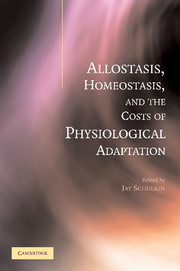Book contents
- Frontmatter
- Dedication
- Contents
- Preface
- Contributors
- Introduction
- 1 Principles of Allostasis: Optimal Design, Predictive Regulation, Pathophysiology, and Rational Therapeutics
- 2 Protective and Damaging Effects of the Mediators of Stress and Adaptation: Allostasis and Allostatic Load
- 3 Merging of the Homeostat Theory with the Concept of Allostatic Load
- 4 Operationalizing Allostatic Load
- 5 Drug Addiction and Allostasis
- 6 Adaptive Fear, Allostasis, and the Pathology of Anxiety and Depression
- 7 A Chronobiological Perspective on Allostasis and Its Application to Shift Work
- 8 Allostatic Load and Life Cycles: Implications for Neuroendocrine Control Mechanisms
- Commentary: Viability as Opposed to Stability: An Evolutionary Perspective on Physiological Regulation
- Index
2 - Protective and Damaging Effects of the Mediators of Stress and Adaptation: Allostasis and Allostatic Load
Published online by Cambridge University Press: 05 February 2015
- Frontmatter
- Dedication
- Contents
- Preface
- Contributors
- Introduction
- 1 Principles of Allostasis: Optimal Design, Predictive Regulation, Pathophysiology, and Rational Therapeutics
- 2 Protective and Damaging Effects of the Mediators of Stress and Adaptation: Allostasis and Allostatic Load
- 3 Merging of the Homeostat Theory with the Concept of Allostatic Load
- 4 Operationalizing Allostatic Load
- 5 Drug Addiction and Allostasis
- 6 Adaptive Fear, Allostasis, and the Pathology of Anxiety and Depression
- 7 A Chronobiological Perspective on Allostasis and Its Application to Shift Work
- 8 Allostatic Load and Life Cycles: Implications for Neuroendocrine Control Mechanisms
- Commentary: Viability as Opposed to Stability: An Evolutionary Perspective on Physiological Regulation
- Index
Summary
INTRODUCTION
The discovery that there are gradients of health across the full range of income and education, known as socioeconomic status (SES; Adler et al., 1994, 1999; Brunner et al., 1997; Marmot et al., 1991), has emphasized the need to have a biological framework in which to conceptualize and measure the cumulative impact of social factors (i.e., social status, income, education, working and living environments, lifestyle, health-related behaviors, and stressful life experiences on physical and mental health). Biologists are very good at studying mechanisms and not so successful in providing concepts and methods that are usable by social scientists, including epidemiologists, economists, sociologists and health psychologists, for collecting data on groups of individuals in relation to psychosocial variables. In an attempt to make some progress in this direction within the framework of the MacArthur Foundation Research Network on Socioeconomic Status and Health, a number of us have developed a set of concepts and terminology that are intended to help organize the design and measurement of long-term effects of psychosocial factors on disease processes (McEwen, 1998, 2000; McEwen and Stellar, 1993; Schulkin et al., 1994; Seeman et al., 1997; McEwen and Seeman, 1999).
One of the main challenges has been to expand beyond the limitations and ambiguities imposed by the terms “stress” and “homeostasis.” One purpose of this essay is to discuss the physiology of the response to “stress” in terms of a new formulation involving two concepts: “allostasis” and “allostatic load.” We believe that these two terms allow for a more restricted and precise definition of “stress” that refers to an event or series of events that evoke a set of behavioral and physiological responses. These terms also clarify inherent ambiguities in the concept of homeostasis, and we also note the ways in which they replace and clarify aspects of the “general adaptation syndrome” as formulated by the late Hans Selye.
- Type
- Chapter
- Information
- Publisher: Cambridge University PressPrint publication year: 2004
- 40
- Cited by



